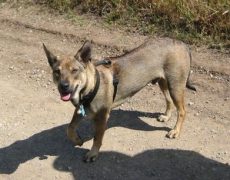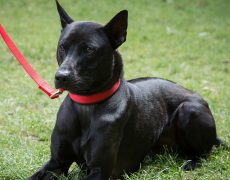Phu Quoc Ridgeback
The Phu Quoc Ridgeback, the smallest of all ridgebacks (the other two being Thai Ridgeback and Rhodesian Ridgeback), is a rare breed of medium-sized dogs originating from the Vietnamese island of Phu Quoc. Its name comes from the ridge of hair that appears as a conspicuous line running along its back from the neck to the tail. It is characterized by a small head, moderately long snout, long neck, thin, long ears, tapering belly, straight legs, webbed feet, and a tapered tail.
Phu Quoc Ridgeback Pictures
- Cho Phu Quoc
- Phu Quoc Dog
- Phu Quoc Ridgeback Brindle
- Phu Quoc Ridgeback Dog
- Phu Quoc Ridgeback Images
- Phu Quoc Ridgeback Photos
- Phu Quoc Ridgeback Pictures
- Phu Quoc Ridgeback Puppy
- Phu Quoc Ridgeback
- Vietnamese Ridgeback
Quick Information
| Other Names | Beautiful Island Ridgeback, Cho Phu Quoc |
| Coat | Short, straight, coarse, fine |
| Color | Spotted, striped, black, yellow, dark reddish brown, mix of black and golden brown |
| Breed Type | Purebred |
| Group | Hounds, Hunting |
| Lifespan | 14-16 years |
| Weight | 44-55 lbs |
| Size | Medium |
| Height | Less than other ridgebacks |
| Shedding | Average |
| Temperament | Intelligent, loyal, loving, obedient |
| Hypoallergenic | Unknown |
| Litter Size | 4-6 puppies |
| Good with Children | May require supervision |
| Barking | Occasional |
| Country Originated in | Vietnam |
| Competitive Registration/Qualification Information | Not recognized by any major breed organizations or kennel clubs |
Video: Phu Quoc Vietnamese Ridgeback Puppies
History
The origin of Phu Quoc Ridgeback is unclear. However, a few experts and dog enthusiasts consider it as well as other ridgeback breeds to have a common ancestry because of the similar ridge marks along their back. Believed to have been developed in either Africa or Asia, the Thai Ridgeback and the Phu Quoc might have been used for carting, hunting, guarding and escorting throughout their history.
After its inclusion in the French encyclopedic dictionary Petit Larousse, the breed gained some popularity in the west. In Vietnam, 700 purebred Phu Quoc Ridgebacks were registered and acknowledged by the Vietnam Kennel Association (VKA).
Temperament and Behavior
A dignified, graceful dog with a noble personality, the Cho Phu Quoc is known for being a faithful companion. Because of its bold disposition, it will always protect its people from danger. As a natural hunter, it loves to run and chase small animals.
Being a relaxed and even-tempered breed, it can be easily trained to be friendly to people it does not know. It is a sociable animal that can coexist with other dogs. An incredibly energetic breed, the Phu Quo Ridgeback has a reputation for moving swiftly and climbing trees.
Care
Exercise
Being an active breed, the Phu Quoc Ridgeback needs plenty of regular exercises including long walks and off-leash play. You can also encourage its natural instinct to climbing trees and swimming.
Grooming
Its coat does not need much grooming except an occasional brushing or combing with a firm-bristle brush as well as bathing using a vet-recommended shampoo.
Health Problems
Although it is generally a healthy and sturdy breed, it may be affected by gastrointestinal disorders including bloating, while bone and joint issues like hip dysplasia, patellar luxation, and arthritis may also occur. Parvovirus infection can be prevented in Phu Quoc Ridgeback by giving proper, non-counterfeit vaccinations.
Training
Because of its obedient nature, the Cho Phu Quoc can be easily trained to perform any task.
Socialization
If you have small pets such as birds, rabbits, or hamsters in the family, you need to socialize your Ridgeback at a young age. Keep the animals in a separate, protected area and offer them treats for good behavior when they watch each other. Then, put the leash on your dog and move it closer to the other pet. If it remains calm reward it with treats, but if it becomes aggressive, quietly remove your pup from that place.
House training
Start house training your Phu Quoc Ridgeback puppy when it is 3-4 months old. Maintain a feeding schedule and avoid giving it table scraps in between meals. You should also ensure that it does not feed on any leftover meal. Take it out to poop after it wakes up in the morning and then in every 30 minutes span. Taking it to the same place each time will help it in recognizing its potty spot. When it defecates outside, reward it with a treat or take it for a walk.
Feeding
While high-quality dry food is recommended for your dog’s health, you may occasionally give it biscuits and wet dog food along with boiled chicken as treats.
Interesting Facts
- The dog was chosen as the mascot for the annual flower show (Nguyen Hue Flower Street) held in Ho Chi Minh City in 2018, representing the Year of the Dog according to the Vietnamese zodiac signs.















